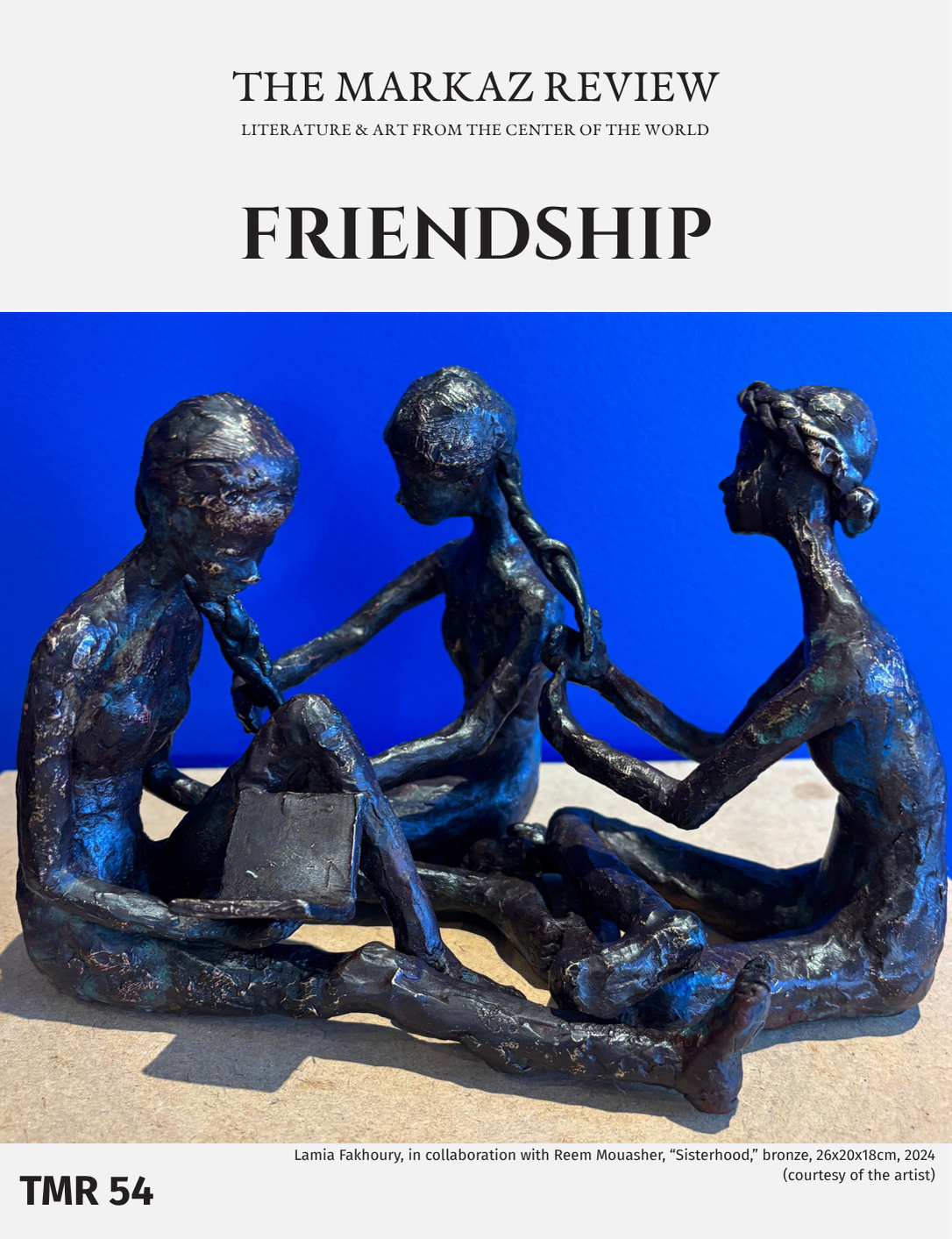X has an extraordinary talent for making friends. You’d find yourself, almost instantly, immersed in a conversation with him, feeling entirely at peace, accepted wholly without judgement. But be warned, the person who befriends people as easily as breathing, will destroy those same friendships with a tremorless hand.
Translated from Arabic by Nada Faris
X is a large, fat man in his mid-forties with a ruddy face. To appear more rugged, he grew a beard and shaved his head with a razor. And, sometimes, to avoid resembling a plate of maqlouba, he’d even cover his head with a baseball cap.
But why do you need to know about X?
Because, if you were born in the eighties or the nineties, you’d recognize a shared trait; namely, that he is neither real nor made up. This level of verisimilitude is tricky, because it means that X is a character drawn from real life and one that is simultaneously dipped in imaginary ink. However, it might also mean that X has successfully blurred the lines between his corporeal body in the physical world and his personal avatar in the virtual realm.
This other reason might inspire you to learn about X: He’ll be thrilled to learn about you, too.
X has an extraordinary talent for making friends. You’d find yourself, almost instantly, immersed in a conversation with him, feeling entirely at peace, accepted wholly without judgement. You would believe that X shares all your opinions because he’d mirror your tone, your energy, your excitement, like an effervescent lozenge erupting in a glass of water. Unfortunately, he will also emulate the tepidity we all resort to in the end, when we try to protect ourselves from false displays of affection.
You will see yourself reflected as if in a body of water, regardless of your interests or affiliations. His mental state will adapt instantly to match even the subtlest changes in your demeanor. This is why you will feel as though you’re in the company of a magician, and you will immediately desire to become his friend.
In fact, X has always dreamed of becoming a professional magician, for he sought to live an entertaining life. It didn’t matter to him if he became the type that showed up to children’s birthday parties, concealing a rabbit in his top hat; or the kind of magician who’d penetrate the Great Wall of China and make the Statue of Liberty disappear, à la David Copperfield.
He began to dream about becoming a magician after watching a rare program on an Egyptian channel, one that had managed to slip past the censors, who were screening programs as part of a training plan to mold ideal citizens, those who are suited for a lifetime of conformity.
But be warned: the person who befriends people as easily as breathing, will destroy those same friendships with a tremorless hand.
Periodically, X would take inventory of his friends, then ponder one question: Who do I need to eliminate from my life for committing the crime of becoming an unbearable bore?
His perspective on friendship became a conviction over the years. And since he now believes that life should be perpetually joyful, he treats anyone who fails to spark pleasure in him as if they had never existed. This philosophy, by the way, includes you as well.
He will cut you off the moment you believe that your bond is unbreakable. In the end, you’ll learn how he merely used you to pass the time. But, can you really blame him? After all, you used him too — gazing at your own reflection in his face, trying to heal your fragmented self in that mirror. So, isn’t this mutual exchange reassuring?
X could have been a secularist, an Islamist, or an atheist. A revolutionary, a reactionary, or even a conservative. A genius, a level-headed man, or a clown. He could have even been of noble birth. People have ascribed to X these various identities, not because any of them are true, but because of his ability to disappear behind any mask.
The truth is that X hates being alone. The games he plays and the tricks he employs serve as weapons in the war against solitude and boredom. His battles against these foes mirror the slapstick comedy in the Melody Channel’s popular commercials.
Loneliness and boredom compel us to think. A dangerous act. And self-reflection, sometimes, is simply a curse that frees madness from its shackles. X wants an image to reflect so he doesn’t have to represent himself. This realization terrifies him. You, on the other hand, are frightened of an image that doesn’t resemble your face.
Of course, X has his own opinions and dismisses yours; or, perhaps he simply doesn’t take you seriously. He’s been through a lot, learned a lot, and seen a lot. These days, he finds no real value in defending his positions. Stubbornness, after all, drains the fun from these debates. His experience has taught him that earth-shattering controversial thoughts are merely ripples in a teacup, eroding our relationships and self-esteem — in other words, destroying us.
X could have been a secularist, an Islamist, or an atheist. A revolutionary, a reactionary, or even a conservative. A genius, a level-headed man, or a clown. He could have even been of noble birth. People have ascribed to X these various identities, not because any of them are true, but because of his ability to disappear behind any mask.

If you wanted to pin him down, however, you’d list these more specific addictions: alcohol, nicotine, junk food, diets, gym, porn, collecting friends and old currencies, Premier League football, building and destroying civilizations and waging war online, fantasy games, card games, domino cafe and backgammon, hanging out, Forex trading and losing his pocket change while endlessly hoping that his desire to gamble his life away remains entertaining and that real money might turn into the green plastic prop used in the movie Lucky Bank.
This doesn’t mean that he is wasteful with money, by the way, because he’s quite frugal with the salary he’s accumulated through years of dedicated work. Despite lacking experience, he was still the best candidate for the role, or at least managed to appear as such, for it was nepotism that secured his position for him. Hence, probably unlike you, he managed to retire early. This dream of financial freedom, though supposedly available to us all, remains frustratingly out of reach. After all, freedom in a country that neither respects nor desires liberty amounts to nothing more than gazing into a vast, frightening abyss.
Day after day, he faces increasingly precarious financial conditions. He might have to abandon his early retirement, though he hopes the Kingdom of pleasure he’s built over the years will endure. But how much longer can he resist? And when will the magician run out of tricks?
One of the projects he has attempted to implement at work is creating an Arabic version of the “Six degrees of Kevin Bacon” game, which is based on the theory that any two people in the world can be connected through six others, while this version specifically tries to link people to the actor. Of course this would be his dream game. Imagine him being driven by his knowledge — knowledge that has nothing to do with you and everything to do with Meryl Streep, Mel Gibson, or any other star that captivated him in childhood.
He even wrote a script for the first episode, and bought a lighting kit and chroma key, but after several attempts in front of the camera, he couldn’t utter a single word and gave up on the whole project, because he grew nervous in front of the metal demon and its insatiable hunger for images.
X watches Premier League football, rarely missing a match. These predictable hours guarantee him opportunities to kill both time and boredom. However, his favorite European team is Juventus that plays in Serie A, whose squad during his teenage years included legendary players, such as Roberto Baggio, Didier Deschamps, Zinedine Zidane, Del Piero, Antonio Conte, Edgar Davids, and Christian Vieri. It’s considered a dream team for its great achievements. Yet, because the losses are as memorable as the victories, it’s also known as a legendary team.
What heartbreak it is for a team to come so close to realizing their dreams only to suddenly collapse, leaving fans waiting decades for their return as invincible heroes. No matter how many victories or how many Italian league titles they’ve won over the years, their triumphs never hold the same weight as they did in the past. This is how greatness, love, entrapment, sorrow, disappointment, and despair are born in the heart.
X’s own life has begun to mirror the team’s trajectory: good and stable, yet lacking magic. His real problem is numbness. These days he only experiences an emotional earthquake when Al-Ahly scores a goal. Though he denies his support for the Egyptian team, claiming that Egypt doesn’t take football seriously enough, he nevertheless cannot shake off his nostalgia for that Friday evening.
X prefers to read the biographies of American leaders, like Barack Obama and Hillary Clinton. Their views of the Middle East baffle him — a master’s gaze behind a glass panel. Among Egyptian leaders, he favors the biography of Amr Moussa, admiring his elegance, charismatic magnetism, and even his narcissism, which doesn’t try to conceal itself. Above all, he appreciates how Egypt’s most popular minister of foreign affairs stirs within him a longing for an era of comprehensible corruption.
His favorite novel is Utopia by Ahmed Khaled Tawfiq. Despite being middlebrow, he considers it an ingenious work of literature, not for its literary prowess, but for the author’s ability to craft a strange story that captures the reader’s curiosity. That man even predicted the revolution!
X loved the revolution. One image remains vivid in his memory, of him standing with a group of strangers at one of the local committees, a scarf wrapped around his neck to protect him from the cold.
He adores all things fun, humorous, and light, unless his assumed persona compels him to deal with depth. This, however, doesn’t make him frivolous. In fact, he has tried to contemplate deep and original ideas, but they all frightened him to death, leaving him with scars and failures. Over time, he struggled to understand how serious and novel thoughts could accurately interpret today’s events. And unlike you, X doesn’t follow the news out of interest in current affairs. Instead, he craves the feeling of novelty itself, that fleeting emotion that cannot take root in the soul, vanishing like footprints in the sand, or like a fragrance dissipating in the air before it even reaches the nose. Perhaps novelty is inherently this transient, or perhaps X’s imagination simply cannot grasp permanence. Novelty serves as neither burden nor aspiration for him. It is merely a tool helping him remain engaged in his Faustian bargain to kill time.
But can you blame him for averting his gaze? Haven’t we forced everyone to turn away from tragic events? We’re now only permitted to steal furtive glances, each according to their whim.
X, for example, likes to sneak a peak at women. This can be a harmless activity, free of consequences or complications if done appropriately, as when the gaze is neither creepy nor obscene, like those innocent glances performed by actors in the contractor movies of the eighties and nineties: a look where the jaw drops and eyes pop out of their sockets, cartoon-style, saliva dripping down the chin.
Of course, he would never make that face in public. If we have understood how X’s face has gradually hardened into a calcified mask, we’d likewise understand that this miserable expression would be hiding underneath it.
I don’t think X is evil. He simply doesn’t know any other way of seeing or expressing his yearning. He acts as if he were still living in the previous century, with a wall separating him from the present. No one knows whether he built this wall himself, or if time silently transformed into a pile of stones around him. Either way, he surrendered, for behind this wall lies safety. Behind this wall exists a benevolent system that allows us to outsmart it. Or, put differently, it wouldn’t surpass our own intelligence. Perhaps this wall does not offer escape exactly, only slightly more effective ways of enjoying ourselves. Behind this wall stands a simple playground, film clubs, evening parties, card games (especially Estemation), a peaceful mind, dream teams and legends, and modest hopes that haven’t yet been crushed.
X tells horrifying tales about his wife, half true, half invented, yet all of them, in his mind, deserved. Both trapped in an iron cage, yet neither intends on escaping their failed and frustrating union, despite their mutual hatred, so he treats himself like a child craving attention and care, telling other women that he is in fact available, and that they shouldn’t be discouraged by his weight, for his magical ability to make friends is likewise capable of attracting women anywhere. Though challenging at times, both skills stem from the same root: seduction — the belief that someone has completely devoted themselves to you; abandoning the world and choosing you. Today, we view this gift as innate. Yet, seduction isn’t understanding others. It is, rather, at its core, complete indifference.
But woe to the woman who rejects him, for he would spread countless false stories portraying her as a whore, and he would plant these tales in the minds of all his listeners, with a peculiar blend of evil and innocence found in a child’s hands.
He views women’s unhappiness as a classic trope, believing they were born with it and therefore shouldn’t be persuaded out of it. When discussing women, he resorts to generalizations, convinced their lives revolve solely around whining constantly. This is how he characterizes all his arguments with his wife: persistent nagging.
X has one positive story about a woman that he enjoys repeating. Since his teenage years, two figures would visit him in his dreams: a man and a woman. The woman would bring serenity in anxious times, and she would reassure him that everything would be alright. Because of her, he would wake up smiling. In contrast, the male figure was a sword-wielding butcher with murderous intentions, and because of him, X would wake up terrified.
X claims that he finally met the woman from his dreams in real life and recognized her instantly from her appearance, which he knew so well. Despite her kindness, the woman brought him no peace, because he immediately began to wonder if meeting her meant that his appointment with the butcher was fast approaching.
Nobody knows if this story was made up. If it really happened, it likely doesn’t mean he met the woman in his dreams. Rather, he projected his fantasies onto a woman he liked. It might also mean that his life, despite all his cunning, lacks tranquility.
The butcher hunting him down to chop off his head, on the other hand, must be a metaphor for Death, for no one can manipulate their age, so the farther he runs from the butcher, the nearer his end becomes, because Death ruins parties.
Now, if the story were fabricated, it would mean two things. First, this is a pick up line he uses to make women feel exceptional, as if their mere presence carries an apostolic fervor and saving grace. Second, it reveals his craving for tragedy.
However, the butcher is undoubtedly real.
X is excessively proud, yet every challenge to his fragile ego feels like an unbearable torment — a sensitive alarm that could go off at any moment. Though frequently angry, he refuses to let his anger erupt outwardly or to confront it inwardly, except through deceptive means and masks, so he puts on more weight daily, and all his weight loss plans collapse the moment they begin to show results.
He struggles with clinical depression, and during panic attacks, he cries, trembles, and screams, calling out for his mother, whose death he never felt compensated for. A gentle touch from anyone would soothe him, for he remains a child at heart, though he refuses to befriend his own emotions, and once he finally regains composure, he remembers that honesty is too heavy a burden to bear, for it ruins the game. This is why his indispensable companions — and you are not among them — are only three: a bottle of wine concealed in his bag, an electronic hookah, and a medal from Juventus.














